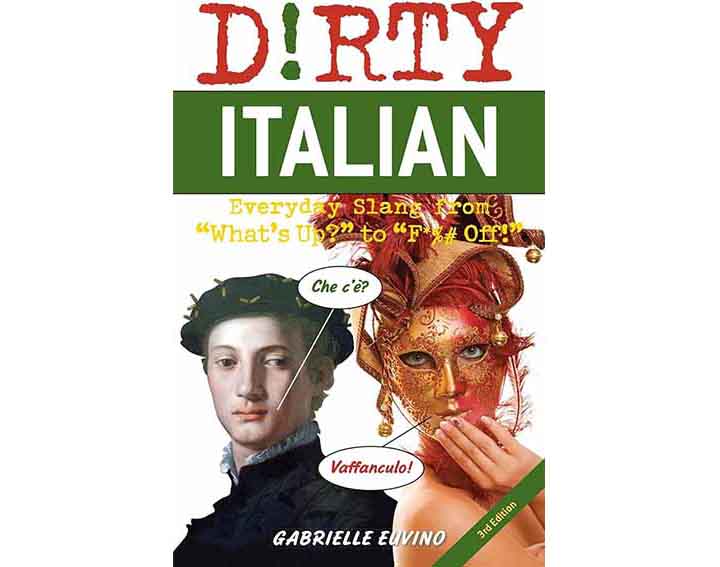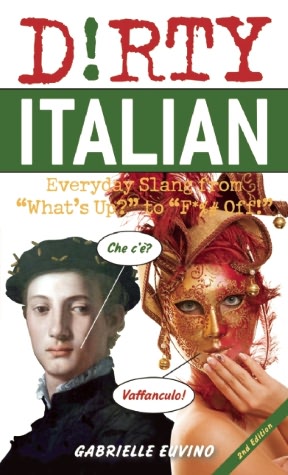
Un Corso Intensivo di Italiano Colloquiale
An Intensive Crash Course in Colloquial Italian
Dallo Scolastico al Piccante
From Academic to Spicy
Qualche settimana fa, Alice Riegert della Ulysses Press mi ha contattato per propormi una copia da recensire del libro di Gabrielle Euvino, Dirty Italian: Everyday Slang from Innocent to Offensive. All’inizio ero titubante—pensavo fosse uno scherzo. Tuttavia, la curiosità ha avuto la meglio, e ho deciso di dargli un’occhiata.
A few weeks ago, Alice Riegert from Ulysses Press reached out to offer me a review copy of Gabrielle Euvino’s book, Dirty Italian: Everyday Slang from Innocent to Offensive. At first, I was hesitant—thinking it might be a joke. However, curiosity got the better of me, and I decided to give it a look.
Cosa Troverai nel Libro?
What’s Inside the Book?
Euvino, un’insegnante di italiano e autrice di The Complete Idiot’s Guide to Learning Italian, esplora il lato meno raffinato e più vivace della lingua italiana. Anche se lontano dal classico libro di testo, Dirty Italian offre spunti pratici e divertenti su espressioni colloquiali e slang quotidiano. Sono quelle frasi e parole che non si imparano in classe ma che sono fondamentali per comprendere davvero la cultura italiana contemporanea.
Euvino, an Italian teacher and author of The Complete Idiot’s Guide to Learning Italian, dives into the less polished, more colorful side of the Italian language. While it’s far from your traditional textbook, Dirty Italian offers entertaining and practical insights into everyday slang and colloquial expressions. These are the phrases and words you won’t learn in a classroom but are essential to understanding contemporary Italian culture.
Perfetto per gli Amanti del Cinema
Perfect for Cinema Lovers
Se sei un appassionato di cinema italiano come me, questo libro è un must. Prima di guardare il film Baciami Ancora, ti consiglio vivamente di leggere Dirty Italian. Il film è pieno di espressioni idiomatiche e slang che potrebbero lasciare perplessi i non madrelingua. La guida di Euvino funziona come un corso intensivo, fornendoti gli strumenti per seguire i dialoghi moderni e veloci.
If you’re a fan of Italian cinema like me, this book is a must-read. Before watching the film Baciami Ancora, I highly recommend picking up Dirty Italian. The movie is packed with idiomatic expressions and slang that can leave non-native speakers scratching their heads. Euvino’s guide acts like a crash course, equipping you with the tools to follow the fast-paced, modern dialogue.
Perché è Utile / Why It’s Useful
Rilevanza Culturale: Perfetto per comprendere film italiani moderni o decifrare conversazioni online.
Cultural Relevance: Perfect for understanding modern Italian films or decoding online conversations.
Apprendimento Divertente: Aggiunge un tocco di intrattenimento all’apprendimento della lingua.
Humorous Learning: Adds an entertaining twist to language learning.
Prospettiva Unica per gli Italiani: Gli italiani potrebbero trovare divertente la traduzione delle loro espressioni colorite in inglese.
Unique Perspective for Italians: Italians may find the translation of their colorful expressions into English amusing.
Uno Sguardo al Lato Volgare
A Peek Into the Vulgar Side
Preparati a scoprire frasi con parole come cazzo, schifo, merda e culo. Non adatto ai più sensibili, questo corso intensivo nello slang italiano è tanto sorprendente quanto divertente.
Be ready for phrases featuring words like cazzo, schifo, merda, and culo. While not for the faint of heart, this crash course in Italian slang is both eye-opening and entertaining.

Find more Italian books and learning materials
on the Matta Amazon Page












I have had this book for a couple of years and drag it out frequenty while watching Italian movies. It is hysterical, and while I have had few opportunities where I have wanted to use one of these interesting phrases, it is fun to think of applying one, but I always suppress that inclination. About as strong as I would ever get in conversation is “nientemeno! o porca miseria.”
Ho avuto questo libro per due anni piu’ o meno, e lo uso frequentemente quando stava vedendo i film italiani da Netflix. Sono troppo divertente, e finche’ avevo avuto poche opportunita’ dove avevo desiderato ad usare queste frase interresante, ma e’ divertente ad pensare di usarli. Solo dicevo “nientemeno” or “porca miseria” quando stavo parlando con i miei amici che stavano studiando italiano con me.
Ciao Jan! Hai ragione, il libro è bello come un punto di riferimento, ma meglio evitare usare una di queste frase. Si può sentire queste frase nei film e nei programmi televisivi tutta la volta…però quando ho usato la frase “non me ne frega niente” con gli amici Italiani, i loro occhi sono diventati grandi e mi hanno detto di non usare mai quella frase! Quando ho cercato di dirgli che non sembrava troppo brutta visto che gli attori e la gente la usa ogni giorno…ma loro mi hanno consigliato per una straniera è una cosa diversa! 🙂
La mia professoressa anche mi ha detto un avvertimento in riguardo “me ne frego.” A me questa frase sembra come “I could care less”, non “I don’t give a s*?t.” Possa imaginare la reazione se lei abbia detto “vaffanculo”?
Noi ridiamo costantemente sulle parolaccie descritte usuavano a descrivere le donne ed il corpo d’una donna. Che peccato! Ho paura a comprare certe frutte in Italia!!! Lei sa le quale che sto riferendo!!! La mia professoressa e’ nato in Sicilia, e ci sono molto altri parolaccie in dialetto che mancavano il rispetto verso le donne.
Leggo il suo blog ogni giorno e mi piace molto!
Janice
Anch’io non voglio fare una brutta figura e scambiare fico o figo con fica! Che confusione! Anche se ho buone intenzioni di dire la parola giusta, sono sicura che la bocca mi tradirà e uscirà la parola sbagliata!
Minchia,non sapevo che “schifo” fosse una parolaccia.
non direi che “schifo” è una brutta parolaccia esattamente, però è perfetto per esprime il sentimento che qualcosa non va bene. è come il nostro “that sucks”, “that’s shitty”, “that is gross”….dipende 🙂
Là ove l’italiano diviene reticente e utilizza frasi quasi forbite, o da educande, arriva il dialetto a supplire con espressioni colorite o più energiche e a volte arricchiamo col dialetto espressioni già forti in italiano; alla fine della fola ci sono talmente tante varianti che è impossibile fare un libro esaustivo, ma una guida è utile per non dire la cosa sbagliata al momento sbagliato
🙂
Posso dire soltanto che ne ho dette tante sbagliate e chissa’ quante personne ho offeso o fatto ridere in tutti quest’anni che vado in Italia. Sono sicurissima d’aver usato la frase “non me ne frega” moltissime volte e ora sento che, per una straniera come me, non va. Accidenti! Immagino che avro’ fatto tanti, tanti sbagli nel mio tempo in Italia. Posso soltanto sperare che dopo hanno finito di ridere possano almeno apprezzare che si prova!
However, I must get this book before I leave for my trip!
Uh… confesso che dire non me ne importa niente o non me frega niente mi è uscito spesso come sinonimo.
Fino che una persona mi ha fatto notare che io ero molto maleducata.
Piccola nota… poi la stessa persona diceva minchia(sdoganato da Montalbano, evidentemente) ad ogni piè sospinto e quella maleducata ero io.
Rimasi un po’… stupefatta dalla cosa.
Dipende dall’interlocutore secondo me.
Ed anche dall’intonazione che si usa, e siccome per iscritto l’intonazione non si vede… meglio non scriverlo. 😀
Forse.